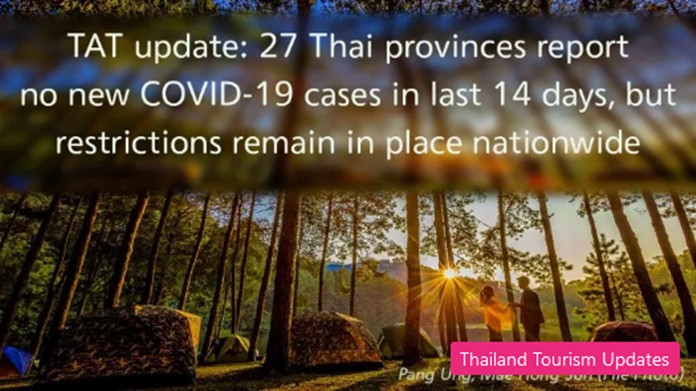
TAT would like to remind all international and domestic tourists to stay safe through this difficult time, prepare for the time when travel and tourism returns, and we can all enjoy the amazing Thai travel experiences with our beloved family and friends.
Bangkok, 17 April, 2020, at 13.00 Hrs. – The Tourism Authority of Thailand (TAT) would like to provide further updates that against a backdrop of travel restrictions being introduced nationwide, 27 Thai provinces have reported no new Coronavirus Disease 2019 (COVID-19) cases in the last 14 days, while nine other provinces remained free of the virus. In addition, over the last few days, Thailand has seen a downward trend in the number of new cases.
On 17 April, 2020, the Royal Thai Government reported 28 new local cases of COVID-19, bringing the total to 2,700, and one new death adding the toll to 47. The number of recovered cases is now 1,689 – an increase of 96 on the second day in a row over the previous day. The number of patients, who are still receiving medical treatments dropped below 1,000 for the first time (since 27 March, 2020) to 964.
The number of daily new cases in Bangkok and Nonthaburi has increased in the past few days while those in other provinces has declined. Provinces with the most COVID-19 infections, by the number of total cases, include Bangkok, Phuket, Nonthaburi, Samut Prakan, Yala, Pattani, Chon Buri, Songkhla, Chiang Mai, Pathum Thani, Narathiwat and Chachoengsao.
The 27 provinces that have reported no new COVID-19 cases in the last 14 days are Amnat Charoen, Buri Ram, Chiang Rai, Chanthaburi, Kanchanaburi, Kalasin, Lamphun, Lop Buri, Maha Sarakham, Mae Hong Son, Mukdahan, Nakhon Nayok, Nong Bua Lam Phu, Nong Khai, Phetchabun, Phetchaburi, Phrae, Ratchaburi, Roi Et, Saraburi, Samut Songkhram, Si Sa Ket, Sukhothai, Udon Thani, Uttaradit, Uthai Thani and Yasothon.
The nine provinces that remain free of the COVID-19 infection so far are Ang Thong, Bueng Kan, Chai Nat, Kamphaeng Phet, Nan, Phichit, Ranong, Sing Buri and Trat.
Thailand is divided into 76 provinces and one special administrative area (the capital Bangkok).
Thai Prime Minister General Prayut Chan-o-cha said that the continuous decline of the number of new infected patients was an indicator that the Centre for COVID-19 Situation Administration (CCSA) would take into consideration to decide whether any restricted measures should be relaxed.
The Prime Minister also stated that the CCSA would take the situation in various aspects into account in making decisions related to the Emergency Decree, which would end on 30 April, 2020. Even though the situation has become less intense and the curve is somewhat flattened, everyone must keep their guard up, and continue to comply with the Government’s measures; otherwise, the situation could be reverted.
“The Government would assess the situation again during the last week of April 2020. Nevertheless, the risk is still high for social or mass gatherings. Relaxing measures would be done in a gradual manner since the spread of COVID-19 is still seen in certain areas, especially in the Central part of the country, Bangkok and vicinity, and the South. Preparation must be carefully made in all aspects including public cooperation. If the Government allows the reopening of businesses, necessary measures, e.g., temperature checks, provision of alcohol gel, or the limitation of the number of clients, have to be put in place,” said the Prime Minister.
REMINDER: National State of Emergency
On 25 March, 2020, the Royal Thai Government declared a State of Emergency and enacted the 2005 Emergency Decree in an effort to combat the spread of COVID-19 in Thailand. The Emergency Decree is in place from 26 March, 2020, to 30 April, 2020. And as stated above, the Government would assess the situation again during the last week of April 2020.
A recap of the first raft of measures issued under the Emergency Decree
Restrictions for access to risk areas.
Closure of risk areas.
Closure of entry/access points (land, sea and air) to the country.
Restrictions on hoarding of consumer items and ensuring of price controls on items.
Restrictions on large gatherings.
Restrictions on the deliberate dispensing of distorted information.
Avoid commuting between provinces.
Restrictions for people under 5 years of age and over 70 as those with chronic medical conditions from leaving their living premises unless extremely necessary.
Additional measures
Nationwide night-time curfew from 22.00 – 04.00 Hrs. from 3 April, 2020, until further notice.
Banning all incoming passenger flights from 4 April, 2020, until 30 April, 2020.
Bangkok and the 76 provinces have also issued specific restrictions that vary from province to province, including provincial border closure, hotel closure, alcohol sales ban, etc.
Visa relief measures announced on 7 April, 2020 https://immigration.go.th/content/visa_auto_extension
Any person whose visa has expired from 26 March, 2020, would be automatically extended to 30 April 2020. There is no need to apply for a visa extension at the Immigration Office for this period and would not be fined THB 500 per day for this case.
Aliens who are due for 90-day reports between 26 March, 2020, and 30 April, 2020, are temporarily exempted from reporting during this period until further notice.
Aliens who are holding Border Passes will be allowed to stay in Thailand for now. However, Aliens with Border Passes must depart Thailand within 7 days of the border crossing points opening date.
Aliens are advised to follow announcements regarding Immigration measures closely for updates. (Currently measures have been announced until 30 April, 2020, or further updates)
Public transport suspend/adjust services
For domestic and international air travel, kindly check with the respective airlines regarding flight suspensions and the options for tickets booked during the suspended periods.
Bangkok’s mass transit systems: Airport Rail Link, BTS Skytrain and MRT Bangkok Metro have adjusted their daily operating hours to fall between 05.00 – 21.30 Hrs.; Bangkok’s bus and boat service hours are also in accordance with the curfew.
Inter-provincial bus services on routes with a distance of over 300 kilometres, including ticketing services, have been suspended. Services on routes with a distance of less than 300 kilometres are still operating, from 05.00 – 16.00 Hrs., at reduced frequency with strict social distancing rules applying.
Long-distance train services on about 30 routes from Bangkok to the North, Northeast and South have been suspended.
Once again, TAT would like to remind all international and domestic tourists to stay safe through this difficult time, prepare for the time when travel and tourism returns, and we can all enjoy the amazing Thai travel experiences with our beloved family and friends.
In the meantime, please adhere to the recommendations to prevent the COVID-19 infection by the Department of Disease Control, Ministry of Public Health:
If anyone makes contact with other people or visits risk areas, when they return home, it is recommended to clean their body, take a bath or shower, wash their hair, and change clothes before meeting with elder relatives (avoid close contact with the elderly).
Eat well-cooked food, use separate bowls, dishes and personal spoons and forks, and keep a distance between seats of at least 1 metre.
Refrain from joining groups for drinking any kinds of alcoholic beverages.
Regularly clean the house including appliances and furniture.
Avoid prolonged exposure to sunlight during the summer. Be careful not to dehydrate. Keep healthy and get enough sleep.
The Department of Disease Control, Ministry of Public Health, also gave suggestions for the elderly group and those with underlying diseases; such as, high blood pressure, diabetes, heart disease, chronic obstructive pulmonary disease, chronic renal failure, etc., that they should stay inside the house. Do not let unknown people come near you. Refuse to participate in social activities or traditional activities with groups of people. Stay at home with hobbies to relax; such as, watering plants, cleaning the house and exercising to maintain good health.
 |
 |
 |





